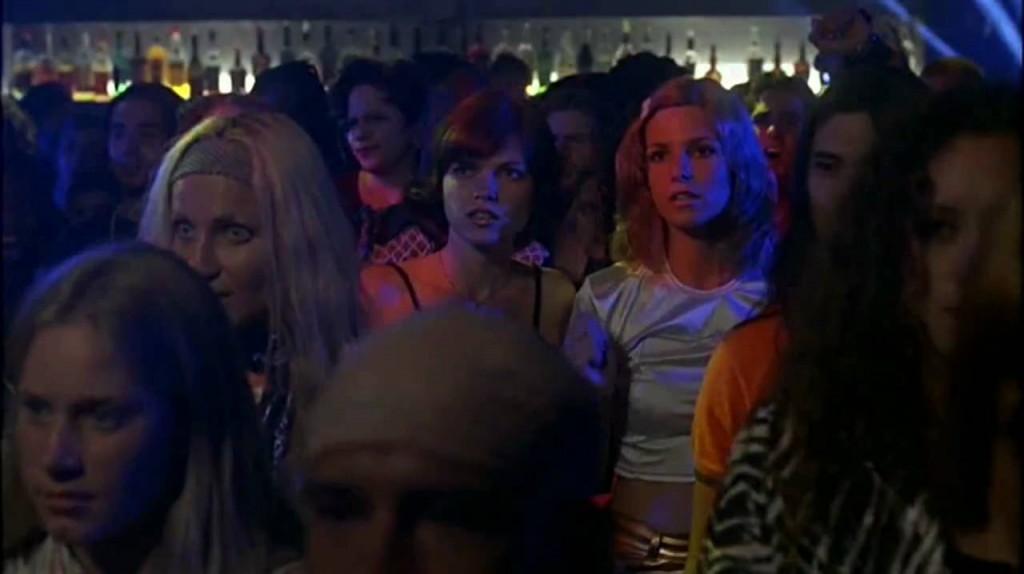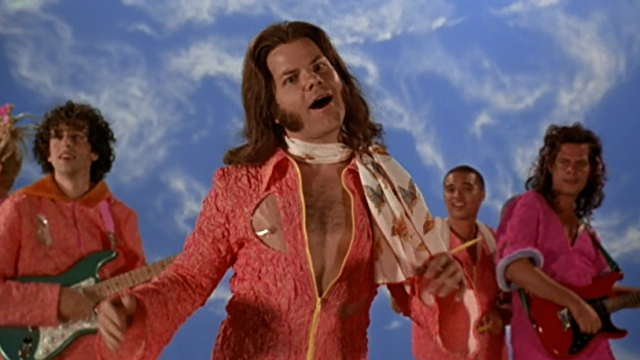In 1996, the relatively popular late-night sketch show Kids in the Hall released a movie. This is nothing new. Monty Python had three. Saturday Night Live had countless of them. Even SCTV had the cult favorite Strange Brew. What was new was that this one was completely and utterly buried by Paramount at the time of its release, and for, at the time, seemingly no reason. Ultimately, Brain Candy would make just over $2m, a complete disappointment for what seemed like an extremely popular troupe.
When I say buried, I mean it was killed with a knife in its back. This was a movie that had barely any advertising, was released for 2 weeks total to widely mixed reviews (Siskel and Ebert were hilarious), and quickly eliminated from the relatively few theaters. I was 15 at the time, and I had to beg my father to take me to a non-indie multiplex two cities over…and ultimately we missed the movie because of other issues at the time. The VHS took over a year to come out.
Brain Candy is a strange beast, and it shouldn’t be a wonder that it was met with bafflement. Brain Candy‘s thrust is the development of the ultimate anti-depressant which is guaranteed to make you happy with minimal side effects. Well, except the drug was rushed into production with little time for testing, and the long term effect was that it put people into the happiest comas ever. Like any good sketch show, the main plot was also a good trunk on which to hang the branches of a variety of different sketch-like stories: the first patient is an old lady abandoned by her selfish drunken son, a married father of two is a closeted homosexual, a goth-industrial singer finds solace, and Cancer Boy finds fame.
On the surface, it seemed that the Kids were railing against the oncoming onslaught of positivity that would start in the late 1990s and blossom in the 2000s. This is a comedy that begins with a taxi driver pissing off a homeless bum, and then singing a “nursery rhyme” from his mother, “Life is short. Life is shit. And, soon it will be over.” It concludes with the doctors developing a depression drug, commenting “We have a whole world to bum out.” Almost everybody in the movie is either an asshole or is delusional…or both. It’s a bleak world that the Kids are presenting, satirized within an inch of its life. The overall theme of the surface is that happy drugs aren’t the answer and that there’s a whole world of emotions to go feel.
 Underneath the anti-pharma messaging, there’s a sly undercurrent of anti-commercialism that permeates Brain Candy‘s every thought. The characters of Brain Candy are never very far from a marketer, television, band, reporter, or camera crew. Brain Candy was originally supposed to be called the generic The Drug, which it frequently is called in the film. As a generic stand-in, the drug becomes anything that is marketed at you.
Underneath the anti-pharma messaging, there’s a sly undercurrent of anti-commercialism that permeates Brain Candy‘s every thought. The characters of Brain Candy are never very far from a marketer, television, band, reporter, or camera crew. Brain Candy was originally supposed to be called the generic The Drug, which it frequently is called in the film. As a generic stand-in, the drug becomes anything that is marketed at you.
The closeted but married father is frequently hiding out upstairs where he’s masturbating to a hilarious gay porn that seems to be a “making of” a sexy fireman calendar with the soundtrack screaming “He’s on Fire!” He gets arrested in a rest stop bathroom bust when he is too cowardly to figure out that he should be running. The final time he’s jerking it to the gay porn, he pops the pill and has a memory of his homosexual experiences in the army…finally realizing he’s gay in a flaming musical number. He turns up again at another gay orgy bust, but this time around he’s confident and has embraced the gay life. Finally, in his last scene, he ends up in a stagnant coma of military homosexuality dressed in a sailor suit.
The goth-industrial singer, Grivo, starts out his story singing “Some days it’s dark/Some days I work/I work alone/I walk alone.” He pops up again to rally against the happy pill, screaming “Fuck Happy.” But, when he goes on The Drug, he turns up with the folk-pop song Happiness Pie, an upbeat poppy tune that would be the winner of the Best Metal Single at the VMAs. The powers that be of the VMAs also combined categories so that Cancer Boy would be nominated in the “Best R&B, Rap, and Folk Act” for Whistle When You’re Low, ensuring that a happy nothing tune would beat out the dark or emotional tribulations of R&B and Rap.
Then there’s the drug itself, Gleemonex. At first it is prescription only, but big pharma makes it to go over-the-counter in the middle of the second act. The boss uses the excuse, “You want ghetto children to be happy, don’t you?” just before leading Dr. Cooper into the “real” party.
Dr Cooper, who doesn’t go on the drug, ends up becoming a manufactured celebrity, turning up on The Nina Bedford Show, where instead of asking about the drug, she instructs him to shake his ass because he looks like Tom Jones. He gets to host at the VMAs. He ends up running the marketing schemes for The Drug, including the new offshoot Gleemonex For Pets. He gets swept up in the fame and fortune that he almost loses his own goal of creating a safe and happy populace.
Really, Gleemonex is a stand-in for anything people sell you to make you artificially happy. Whether that’s a “real” party, an embracing of the trappings of homosexual lifestyle, shallow pop music, Funkytown, or even generic nostalgia, Gleemonex symbolizes all of that. If you stay on Gleemonex, you become trapped in your happiest memory, doomed to live in a coma for the rest of your life. As the boss would say, “That’s taking the narrowest view. Because, they’re stuck in their happiest memories.”
The company that makes Gleemonex, seeing the number of coma victims, developed a coma hospital and created its own version of a payout by giving money to the relatives of the coma victims. They’re trapping their consumers in the hospital and doling out money to make sure they don’t get hit with a gigantic lawsuit. It’s very similar to a pre-emptive class-action settlement.
Brain Candy could be read as a railing against marketed product because marketed product creates zombies in the populace. It could be read as the summation of the concept that “comfort breeds complacency.” Which isn’t exactly a gleeful thought. The real message of Brain Candy is that humans need to feel the whole range of human emotions, and shouldn’t be sold on just product that will make you complacently happy.
By 1997, this attitude had started to feel horribly out of date. Sublime’s What I Got hit #1 in modern rock in 1996, and Sugar Ray’s Fly hit #1 1997, marking the death of negativity. I pick on these two because they were both bands that had otherwise specialized in a sort of punk rock before they hit the mellow happiness of fame and fortune, exemplifying Grivo’s career arc. But, these two were hardly anomalous to a culture that decided it was sick of being angry and depressed. By the time Brain Candy came out on VHS (after being killed at theaters), the rampant negativity was so against the culture that it flopped with a dud.
The original, even bleaker, finale finds Dr. Cooper in a happiness coma and being hauled out for an annual parade of the coma victims. Only 5% of the population ended up in comas, but nobody cared. People continued taking the drug, going to the parades, and the populace just became happy all the time. Except the cab driver, who says that it is a fresh hell.
While the current ending has a twinge of hope, it’s the hope of all the negatives in the world finally coming back, and humanity returning to its natural state. It’s a good thing.


